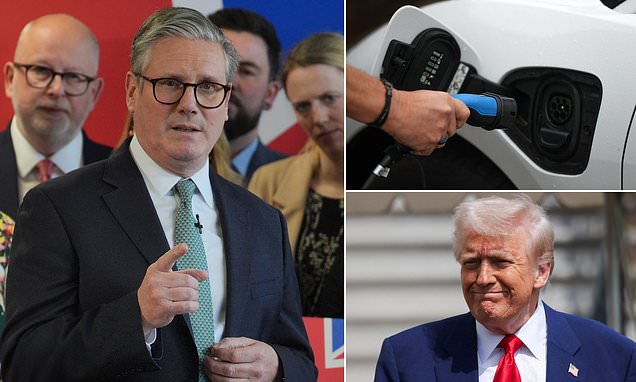Dealers Double Down: Fighting Back Against EV Sales Mandates

Table of Contents
The Impact of EV Sales Mandates on Dealerships
EV sales mandates are forcing dealerships to rapidly adapt their business models, presenting both challenges and opportunities. The impact is multifaceted, affecting their finances, sales processes, and overall operational efficiency.
Financial Strain and Investment Needs
Dealers face significant upfront costs to meet the requirements of EV sales mandates. These investments are substantial and represent a considerable risk.
- High initial investment costs for EV inventory: Electric vehicles often command higher prices than their gasoline-powered counterparts, requiring dealerships to tie up significant capital in inventory.
- Need for specialized training programs for mechanics and sales staff: EVs require specialized knowledge for both maintenance and sales, necessitating investment in comprehensive training programs for employees. This includes training on battery technology, charging systems, and specialized repair techniques.
- Adapting showrooms to showcase and support EVs: Showrooms need upgrades to accommodate charging stations, specialized EV displays, and potentially even changes to lighting and layout to better showcase the technology.
- Uncertainty about return on investment (ROI) for EV infrastructure: The long-term ROI on investments in charging stations and other EV infrastructure is uncertain, adding to the financial pressure faced by dealerships.
Changes to Sales Processes and Customer Service
Selling and servicing EVs requires a different approach than traditional vehicles. Dealers must address new customer concerns and adapt their sales and service strategies.
- Need for educating sales staff on EV technology and benefits: Sales staff need to be well-versed in EV technology, including battery life, charging times, range anxiety, and government incentives. They also need to be able to effectively communicate these benefits to potential customers.
- Addressing customer concerns about range anxiety and charging infrastructure: Range anxiety remains a significant barrier to EV adoption. Dealers need to address these concerns by educating customers about charging infrastructure, range capabilities, and available charging solutions.
- Developing effective marketing strategies for EV adoption: Marketing strategies need to emphasize the benefits of EVs, such as lower running costs and environmental friendliness, to attract and convert potential buyers.
- Handling longer service times for certain EV components: Some EV components, such as batteries, may require longer service times compared to traditional vehicle components, requiring dealerships to adjust their service scheduling and capacity.
Dealer Strategies to Counteract Mandate Challenges
Dealers are employing various strategies to mitigate the challenges posed by EV sales mandates and position themselves for success in the evolving market.
Lobbying and Advocacy Efforts
Many dealerships are actively participating in lobbying efforts to influence the implementation of EV sales mandates.
- Working with industry associations to present a united front: Collaboration with industry associations strengthens their collective voice in advocating for realistic timelines and supportive policies.
- Lobbying for financial incentives for dealers who invest in EV infrastructure: Seeking government support through financial incentives can ease the financial burden of upgrading infrastructure.
- Advocating for consumer incentives to boost EV adoption: Increased consumer demand for EVs will help to offset the higher initial costs for dealerships.
- Highlighting potential job losses due to unrealistic mandate timelines: Emphasizing the potential negative impact on employment can influence policy decisions.
Investment in Infrastructure and Training
Proactive dealerships are investing in the necessary infrastructure and training to support EV sales and service.
- Partnerships with energy providers to install charging stations: Collaborating with energy companies can streamline the installation of charging stations and offer additional services.
- Offering EV-specific training programs to employees: Investing in employee training ensures that staff have the necessary skills to sell, service, and maintain EVs effectively.
- Developing targeted marketing campaigns to attract EV buyers: Targeted marketing campaigns can help to attract customers interested in EVs and highlight the unique benefits that dealerships can offer.
- Exploring partnerships with EV charging network providers: Partnering with charging network providers can provide access to broader networks and potentially generate additional revenue streams.
Diversification and Exploring Alternative Revenue Streams
Dealers are diversifying their offerings to reduce reliance on traditional internal combustion engine vehicle sales.
- Expanding service offerings to encompass EV repair and maintenance: EV repair and maintenance represent a growing market, offering new revenue opportunities for dealerships.
- Exploring opportunities in energy services related to EV charging: Dealerships can expand into energy services by offering charging solutions and related services.
- Investing in subscription models and other new business models: Subscription models and other innovative business models can offer new revenue streams and improve customer engagement.
- Focusing on pre-owned EV sales: The pre-owned EV market is growing rapidly, providing another revenue stream for dealerships.
The Future of Dealerships in the Age of EV Sales Mandates
The future of dealerships in the age of EV sales mandates hinges on their ability to adapt and collaborate.
Adaptation and Collaboration
Success will depend on adapting business models, collaborating with manufacturers, and proactively investing in EV infrastructure and training.
Potential for Growth in EV-Related Services
The growth of EV-related services, such as repair, maintenance, and charging infrastructure, presents significant opportunities for dealerships to expand their businesses and increase profitability.
Government Support and Policy
Government support and policies that encourage a smooth transition and fair competition will be crucial in ensuring the long-term success of dealerships.
Conclusion
EV sales mandates present significant challenges for dealerships, requiring substantial investment and adaptation. However, by proactively investing in infrastructure, training staff, and engaging in effective lobbying, dealers can not only survive but thrive in the evolving automotive landscape. The key is to embrace change and view the shift towards EVs as an opportunity to create new revenue streams and strengthen their position in the market. Dealers need to understand and adapt to these EV sales mandates to secure their future success. Don't get left behind – plan your strategy now to navigate the changing landscape of EV sales mandates and ensure your dealership's continued success in the electric vehicle era.

Featured Posts
-
 How Lizzos Weight Loss Journey Surprised Fans Worldwide
May 05, 2025
How Lizzos Weight Loss Journey Surprised Fans Worldwide
May 05, 2025 -
 Kentucky Derby 2025 Unpacking The Potential Race Pace
May 05, 2025
Kentucky Derby 2025 Unpacking The Potential Race Pace
May 05, 2025 -
 Public Reaction To Lizzos Comments On Britney Spears And Janet Jackson
May 05, 2025
Public Reaction To Lizzos Comments On Britney Spears And Janet Jackson
May 05, 2025 -
 Emma Stooyn Kai Margkaret Koyalei Sxesi I Antiparathesi Sta Oskar
May 05, 2025
Emma Stooyn Kai Margkaret Koyalei Sxesi I Antiparathesi Sta Oskar
May 05, 2025 -
 Nyc Facing Severe Weather Monday What To Expect And How To Prepare
May 05, 2025
Nyc Facing Severe Weather Monday What To Expect And How To Prepare
May 05, 2025
Latest Posts
-
 Cult Members Jailed For Child Endangering Gambling
May 05, 2025
Cult Members Jailed For Child Endangering Gambling
May 05, 2025 -
 Fleetwood Mac Tribute Concert Seventh Wonder In Perth Mandurah Albany
May 05, 2025
Fleetwood Mac Tribute Concert Seventh Wonder In Perth Mandurah Albany
May 05, 2025 -
 Seventh Wonders Fleetwood Mac Tribute Perth Mandurah And Albany Shows
May 05, 2025
Seventh Wonders Fleetwood Mac Tribute Perth Mandurah And Albany Shows
May 05, 2025 -
 Dope Girls Cocaine Electronica And Glamour Redefine Wwi
May 05, 2025
Dope Girls Cocaine Electronica And Glamour Redefine Wwi
May 05, 2025 -
 Dope Girls Review A World War I Drama Unlike Any Other
May 05, 2025
Dope Girls Review A World War I Drama Unlike Any Other
May 05, 2025
